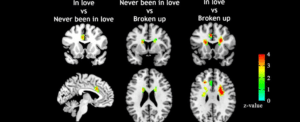Falling in love is incredibly powerful. It consumes our thoughts and affects us in almost every way; physically, biologically and chemically. The preliminary stages can be an exciting whirlwind because of the biochemistry of love, but when it slows down, it doesn’t necessarily lead to love or the relationship you want. After the initial rush, you may be left with disappointment or addiction to seek your next romantic thrill.
This immediate and lustful reaction is particularly prominent now with the rise of online dating. However, does sex, lust and infatuation stop people from finding love? In this article, I will discuss how you can take control of your thoughts to slow the process down and ensure that you are dating the right person for the right reasons.
How love can change your brain
You may think that romantic love is a matter of the heart, but in truth, it all takes place in your brain. Specifically, falling in love takes place in the hypothalamus of the brain. Throughout the different stages of love, the hypothalamus sends neurotransmitters to the pituitary gland. The pituitary gland then releases hormones into the body that give you the feeling and sensation of falling in love.
Attraction and lust are commonly the first stages of love for many of us. With this, your brain releases sex hormones, such as testosterone and estrogen which can increase libido and sexual motivation.
Attraction, on the other hand, causes increased levels of dopamine. Dopamine is considered the reward hormone. The hypothalamus releases dopamine when we feel good such as spending time with loved ones or having sex. With this increase in feeling rewarded as more dopamine is released during the initial stages of attraction, it is no surprise that the feeling can be all-consuming. Furthermore, it is no surprise that we want to experience this feeling over and over again.
Is it lust or love?
While love may remain a mystery to us, scientists have unlocked a telltale sign. The brain scans below show how people ‘in love’ have increased brain activity. In fact, the longer someone is in love, the more brain activity experienced.
Researchers believe that scans such as these can help us to determine whether it is love or simply sex, lust and infatuation.
Biochemistry of love – Is it deception?
Oxytocin is considered a key hormone in the biochemistry of love and relationships. So much so, that scientist will refer to oxytocin as the love drug. Oxytocin combines the feeling of physical aspects of love with trust to lead the way to relationships.
Oxytocin, however, can be deceptive. When released it provides us with a reward and a level of trust. However, these are only short-term feelings that should come and go. Unfortunately, it is easy to mistake these feelings, making you believe your partner is trustworthy, it may even make you think they’re ‘the one’.
In fact, these chemicals are an illusion or a perception. The way you feel could lead you to blindly go into a relationship that isn’t right for you. It may also leave you cynical and disappointed if reality doesn’t meet the illusion you have created.
How to restore biochemical zen in the brain
With all the feelings you experience and the hormones that are affecting your body, it can feel like you are losing your head when you fall in love. However, there are ways to restore the balance of your brain, enabling you to handle the biochemistry of love. This can help to make sure you are making the right decisions for your relationships. It can also avoid you getting caught up in an unhealthy and addictive cycle of misinterpreting lust for love.
Three ways to restore brain zen
- Meditation
Meditation can help to reduce anxiety, helping you to make calm and rational decisions. This is because meditation increases gamma-aminobutyric acid (GABA) in the brain which helps to restore calm and provides a soothing feeling.
- Vitamin B Complex
Vitamin B Complex comprises of eight vitamins, all of which work together to increase your tolerance of stress and promote happiness. B vitamins play a vital role in your mental health, helping to reduce negative thoughts and anxiety. It can also help to regulate dopamine and GABA which is incredibly useful in the first heady heights of love.
- Awareness
Love and lust can do wonderful things to our confidence, self-esteem and happiness, but it is essential to tread carefully, with a rational and sound mind. Be aware that this feeling of love may be a biochemical reaction in the brain. Once you understand more about how the biochemistry of love affects you, you can enjoy it for what it is and control the situation to ensure you retain the power.
As always, I am here to help support your journey and give you the tools you need to make the changes you want to see. If you would like more help in keeping a controlled and rational mind when it comes to love and sex, email me at info@hypnosis-in-london.com to arrange your free 15-minute consultation.
References
HuffPost. (2018). New Study Shows Singles Are Addicted To Online Dating. [online] Available at: https://www.huffingtonpost.com/entry/new-study-shows-singles-are-addicted-to-online-dating_us_5898be67e4b0985224db57c5 [Accessed 10 Jul. 2018].
MacDonald, F. (2018). Scientists Can Now Tell if You’re in Love by Scanning Your Brain. [online] ScienceAlert. Available at: https://www.sciencealert.com/scientists-can-now-tell-if-you-re-in-love-by-scanning-your-brain [Accessed 10 Jul. 2018].
Psychology Today. (2018). Oxytocin: The Love and Trust Hormone Can Be Deceptive. [online] Available at: https://www.psychologytoday.com/us/blog/love-and-gratitude/201310/oxytocin-the-love-and-trust-hormone-can-be-deceptive [Accessed 10 Jul. 2018].



